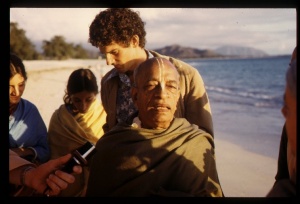CC Antya 3.179: Difference between revisions
m (1 revision(s)) |
No edit summary |
||
| Line 1: | Line 1: | ||
{{ | [[Category:Sri Caitanya-caritamrta - Antya-lila Chapter 03]] | ||
<div style="float:left">'''[[Sri Caitanya-caritamrta|Śrī Caitanya-caritāmṛta]] - [[CC Antya|Antya-līlā]] - [[CC Antya 3|Chapter 3: The Glories of Śrīla Haridāsa Ṭhākura]]'''</div> | |||
<div style="float:right">[[File:Go-previous.png|link=CC Antya 3.178|Antya-līlā 3.178]] '''[[CC Antya 3.178|Antya-līlā 3.178]] - [[CC Antya 3.180|Antya-līlā 3.180]]''' [[File:Go-next.png|link=CC Antya 3.180|Antya-līlā 3.180]]</div> | |||
{{CompareVersions|CC|Antya 3.179|CC 1975|CC 1996}} | |||
{{RandomImage}} | |||
==== TEXT 179 ==== | ==== TEXT 179 ==== | ||
<div class="verse"> | |||
<div | :evaṁ-vrataḥ sva-priya-nāma-kīrtyā | ||
evaṁ-vrataḥ sva-priya-nāma-kīrtyā | :jātānurāgo druta-citta uccaiḥ | ||
jātānurāgo druta-citta uccaiḥ | :hasaty atho roditi rauti gāyaty | ||
hasaty atho roditi rauti gāyaty | :unmāda-van nṛtyati loka-bāhyaḥ | ||
unmāda-van nṛtyati loka-bāhyaḥ | |||
</div> | </div> | ||
| Line 15: | Line 18: | ||
==== SYNONYMS ==== | ==== SYNONYMS ==== | ||
<div class="synonyms"> | |||
<div | ''evam-vrataḥ''—when one thus engages in the vow to chant and dance; ''sva''—own; ''priya''—very dear; ''nāma''—holy name; ''kīrtyā''—by chanting; ''jāta''—in this way develops; ''anurāgaḥ''—attachment; ''druta-cittaḥ''—very eagerly; ''uccaiḥ''—loudly; ''hasati''—laughs; ''atho''—also; ''roditi''—cries; ''rauti''—becomes agitated; ''gāyati''—chants; ''unmāda-vat''—like a madman; ''nṛtyati''—dances; ''loka-bāhyaḥ''—not caring for outsiders. | ||
evam- | |||
</div> | </div> | ||
| Line 23: | Line 25: | ||
==== TRANSLATION ==== | ==== TRANSLATION ==== | ||
<div class="translation"> | |||
<div | " 'When a person is actually advanced and takes pleasure in chanting the holy name of the Lord, who is very dear to him, he is agitated and loudly chants the holy name. He also laughs, cries, becomes agitated and chants just like a madman, not caring for outsiders.' | ||
</div> | </div> | ||
==== PURPORT ==== | ==== PURPORT ==== | ||
<div class="purport"> | |||
For an explanation of this verse ([[SB 11.2.40|SB 11.2.40]]) one may consult Chapter Seven, text 94, of the ''Adi-līlā''. | |||
</div> | |||
<div | <div style="float:right; clear:both;">[[File:Go-previous.png|link=CC Antya 3.178|Antya-līlā 3.178]] '''[[CC Antya 3.178|Antya-līlā 3.178]] - [[CC Antya 3.180|Antya-līlā 3.180]]''' [[File:Go-next.png|link=CC Antya 3.180|Antya-līlā 3.180]]</div> | ||
__NOTOC__ | |||
</div> | __NOEDITSECTION__ | ||
__NOTOC__ | |||
Revision as of 08:48, 25 September 2021

A.C. Bhaktivedanta Swami Prabhupada
TEXT 179
- evaṁ-vrataḥ sva-priya-nāma-kīrtyā
- jātānurāgo druta-citta uccaiḥ
- hasaty atho roditi rauti gāyaty
- unmāda-van nṛtyati loka-bāhyaḥ
SYNONYMS
evam-vrataḥ—when one thus engages in the vow to chant and dance; sva—own; priya—very dear; nāma—holy name; kīrtyā—by chanting; jāta—in this way develops; anurāgaḥ—attachment; druta-cittaḥ—very eagerly; uccaiḥ—loudly; hasati—laughs; atho—also; roditi—cries; rauti—becomes agitated; gāyati—chants; unmāda-vat—like a madman; nṛtyati—dances; loka-bāhyaḥ—not caring for outsiders.
TRANSLATION
" 'When a person is actually advanced and takes pleasure in chanting the holy name of the Lord, who is very dear to him, he is agitated and loudly chants the holy name. He also laughs, cries, becomes agitated and chants just like a madman, not caring for outsiders.'
PURPORT
For an explanation of this verse (SB 11.2.40) one may consult Chapter Seven, text 94, of the Adi-līlā.